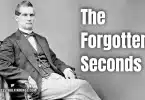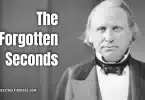Spiro Theodore Agnew, the 39th vice president of the United States, was born on November 9, 1918, in Baltimore, Maryland. His name, though Americanized, hints at his family’s rich ethnic heritage—Greek and German, two cultures steeped in tradition and history. Before his rise to national prominence and eventual disgrace, Agnew’s story began generations earlier in the Mediterranean hills of southern Greece and the Protestant communities of colonial-era Virginia and Pennsylvania.
From Gargalianoi to Baltimore: The Agnew Family’s Greek Roots
Agnew’s father was born Theophrastos Anagnostopoulos in Gargalianoi, in Messenia, a region of the Peloponnese peninsula in southern Greece. The family name, Anagnostopoulos, is a patronymic that translates roughly to “son of the reader” or “son of Anagnostes”—with “Anagnostes” being a Greek term for someone who reads scriptures during Orthodox liturgy. This suggests that the family may have once been connected to church service or held respected positions in their village. The surname Anagnostopoulos is still common in Messenia today.
Theophrastos immigrated to the United States around 1897, during Greece’s great political and economic upheaval. Many young Greek men left the country due to poverty and lack of opportunity, especially after the Greco-Turkish War (1897) and subsequent conflicts. These immigrants often worked long hours in menial jobs and tried to adapt to a new country where they were frequently marginalized or mocked for their customs and religion.
Upon arriving in America, Theophrastos shed the long surname and adopted the shorter, more Anglicized name Theodore Agnew. The transition from “Anagnostopoulos” to “Agnew” was dramatic, but not uncommon. He may have chosen “Agnew” for its simplicity or because it echoed a Scottish or Irish name, allowing him to avoid anti-immigrant prejudice common in the early 20th century.
Theodore Agnew settled in Baltimore, Maryland, a city with a growing population of immigrants, and established himself as a restaurateur. He operated a diner and later a tiny lunchroom, supporting his growing family with modest means. He married a woman of German descent and continued to instill Greek Orthodox values and pride in his children, even though the family appeared to be fully assimilated outwardly.
The Agnew household reportedly spoke some Greek, and Spiro was baptized into the Greek Orthodox Church. However, growing up in a predominantly English-speaking neighborhood, he was raised more as an American than a Greek. Still, he carried his father’s influence throughout his life, and his cultural identity—though understated—remained an important part of who he was.
Margaret Marian Akers: A Line of German-American Protestants
Agnew’s mother, Margaret Marian Akers, was born in Virginia and raised in a Protestant home. Her ancestry reaches back several generations into early colonial America. By the mid-1700s, the Akers family name was found in both Virginia and Pennsylvania, often appearing in records of German Lutheran and Reformed churches and among Palatine German immigrants who came through Philadelphia and settled in the Shenandoah Valley and western Virginia.
While exact lineages may differ slightly depending on the branch, the Akers family likely descends from German-speaking immigrants who arrived in the early to mid-18th century from areas such as the Palatinate, Württemberg, or Alsace. These settlers were drawn by William Penn’s promise of religious freedom and fertile farmland. By the 19th century, many German-American families intermarried with Scotch-Irish or English families in Virginia, gradually shifting toward English language and customs while maintaining Lutheran or Reformed beliefs.
Margaret’s decision to convert to Greek Orthodoxy when she married Theodore Agnew was unusual and demonstrated her willingness to embrace her husband’s culture. She became known as a devoted wife and mother, maintaining a stable and quiet home environment for her children.
Growing Up in Baltimore
Spiro Agnew grew up in a middle-class household in Baltimore’s suburbs. The family was not wealthy. His father’s lunch counter business provided steady but modest income, and the Agnews lived in relatively modest neighborhoods. Spiro attended Forest Park High School and was known as a capable, if not standout, student.
He went on to study at Johns Hopkins University, but his education was interrupted by the onset of World War II. Agnew enlisted in the U.S. Army, where he served with distinction in Europe, rising to the rank of captain. He was awarded a Bronze Star for meritorious service. He returned to the United States to resume his legal studies at the University of Baltimore School of Law, eventually passing the bar in 1947.
The Political Ascent
After a brief legal career and involvement in local civic organizations, Agnew’s first major political breakthrough came when he was elected Baltimore County Executive in 1962. His efficient administration and focus on suburban infrastructure earned him recognition in Maryland political circles.
In 1966, he was elected Governor of Maryland, defeating a Democrat running on a segregationist platform. Agnew appealed to moderates and progressives by denouncing racism, supporting open housing laws, and focusing on responsible governance. Though his record was not without criticism, he was seen as a competent and relatively moderate Republican.
His success in a majority-Democratic state caught the eye of Richard Nixon, who selected Agnew as his running mate in the 1968 presidential election.
Vice President of the United States (1969–1973)
As vice president, Agnew’s most memorable role was as Nixon’s voice of outrage. While Nixon kept a more statesmanlike tone, Agnew attacked the press, university students, and anti-war protesters in stark and memorable terms. His speeches were laced with sharp phrases like “effete corps of impudent snobs” and “hopeless, hysterical hypochondriacs of history.”
These speeches resonated with the conservative base, particularly those disillusioned by the counterculture and civil unrest of the late 1960s. Agnew became a favorite among so-called Middle America—suburban, patriotic, and wary of liberal overreach. For a time, he was seen as a likely successor to Nixon and a 1976 presidential candidate.
Scandal and Resignation
Agnew’s downfall came in 1973, during the unfolding Watergate crisis. While Nixon’s troubles were related to political espionage, Agnew’s stemmed from bribery and kickbacks received during his tenure as county executive and governor. Evidence revealed he had continued accepting cash payments while vice president, often delivered in manila envelopes.
Faced with overwhelming evidence, Agnew negotiated a plea deal. He resigned from office on October 10, 1973, and pleaded no contest to a felony tax evasion charge. In exchange for his resignation, he was spared prison time but was fined $10,000 and placed on probation. His law license was revoked, and his political career ended in disgrace.
Later Life and Reflections
After leaving public life, Agnew lived quietly, working as a consultant and author. He wrote a memoir and a political novel but rarely made public appearances. Despite receiving offers to re-enter the public arena, he refused, stating that his resignation had permanently ended his political involvement.
He died of leukemia on September 17, 1996, in Berlin, Maryland, at the age of 77. He was buried in Dulaney Valley Memorial Gardens, near where he grew up.
Pros and Cons of His Administration
Strengths:
• Agnew’s stance against racism during his 1966 campaign helped prevent the victory of a segregationist candidate, signaling a more modern Republican position at the time.
• His speeches, while inflammatory, gave voice to a significant portion of the American public who felt overlooked during a time of significant national change.
• As county executive and governor, he was known for promoting efficiency and modernizing government processes in Maryland.
Failures:
• His acceptance of bribes and continued unethical behavior while serving as vice president brought shame to the office and permanently altered his public image.
• His aggressive, antagonistic rhetoric deepened political divisions and alienated many Americans during a time when unity was needed.
• His resignation during the Watergate scandal increased public distrust of the federal government.
Spiro Agnew’s story is deeply American in its contradictions. He is an immigrant’s son who rose to one of the highest offices in the land only to lose it through personal corruption. His Greek roots in Messenia and his German-American maternal line connect him to centuries of migration, hardship, and opportunity. For family historians and genealogists, his background offers a fascinating blend of cultures, religious transitions, and the pursuit of the American dream.
Ultimately, Agnew’s life reflects both the possibilities and pitfalls of public service. His name remains a warning in political circles, but his ancestry, upbringing, and rise remind us how complex and human even the most controversial figures can be.






